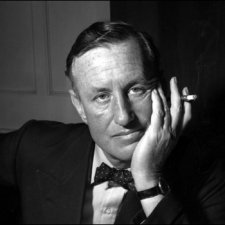 Christmas has come early! Not only is Bond back on the radio, but some special guests will join him, too. Toby Stephens is making a welcome return as 007 in a new radio adaptation of Thunderball (1961), which will be broadcast on BBC Radio-4 on Saturday, 10th December, 2016.
Christmas has come early! Not only is Bond back on the radio, but some special guests will join him, too. Toby Stephens is making a welcome return as 007 in a new radio adaptation of Thunderball (1961), which will be broadcast on BBC Radio-4 on Saturday, 10th December, 2016.
Moreover, the JBIFC can now reveal that Alfred Molina is back as Blofeld, while the popular stage actor Tom Conti will play Largo. Former ‘Saint’ Ian Ogilvy will be the Governor, with John Sessions as Dr. Wain. John Standing reprises his role as ‘M’, Janie Dee returns as Moneypenny, and Julian Sands is ‘Q’ again.
As the fourth 007 movie Thunderball celebrates its 50th anniversary this year, it seems doubly appropriate that the ninth Ian Fleming novel on which the 1965 film was based is to be the next exciting BBC radio James Bond play. Naturally, there will be some key differences between the Toby Stephens adventure and the EON movie. The BBC’s radio drama world of 007 tends to follow the Fleming novels very faithfully.
Earlier this year, the JBIFC revealed that the BBC’s publicity department had let slip that the latest 007 BBC radio adaptation would be transmitted on BBC Radio-4 in December, and we also revealed that Lisa Dillon had taken a role. Dillon has now been confirmed as Patricia, while Janet Montgomery will play the key role of Domino. Produced by Jarvis and Ayres Productions in collaboration with the BBC, the 90-minute audio play, which will be broadcast at 2.30pm GMT on 10th December, is the sixth radio production of a Fleming Bond thriller, and has been adapted by Archie Scottney.
For Your Ears Only
Stephens (see photo) has played 007 in all the previous five radio adaptations. He first took on the role of James Bond in Dr. No in 2008. This was followed by Goldfinger in 2010, From Russia With Love in 2012, On Her Majesty’s Secret Service in 2014, and Diamonds Are Forever in 2015. Toby Stephens is also, of course, very familiar to Bond aficionados as – uniquely – he has played both 007 and a Bond villain! In 2002 he was the creepily suave baddie Gustav Graves in EON’s fourth Pierce Brosnan Bond movie Die Another Day.
Previous radio productions from Jarvis and Ayres have also seen Martin Jarvis as the voice of Ian Fleming. As we have noted previously, Jarvis and Ayres have been praised for their determination to offer faithful adaptations of the original Ian Fleming Bond stories. In 2010, Jarvis explained to the UK’s popular SFX magazine that one of the remits behind his James Bond radio productions is that ‘we’re not making a version of the movie. We go back to the novel and keep great faith with it’.
The Woman Who Invented Bond?
As part of the BBC’s publicity for the new adaptation of Thunderball, and in a real bonus for 007 fans, BBC Radio-4 will also transmit earlier the same day (10th December, at 10.30am GMT) a 30-minute documentary on the relatively unknown story behind the writer Phyllis Bottome, entitled ‘The Woman Who Invented James Bond?’ It will explore the part she played in helping turn Ian Fleming into a highly successful novelist.
As dedicated Bond historians will already know, Phyllis Bottome, who died in 1963 aged 79, was a very accomplished writer herself, whose 1937 novel The Mortal Storm was particularly praised by critics. The novel had a deep message about the terrible abuse of minorities that was taking place in Nazi Germany, and it was turned into a major Hollywood movie starring James Stewart. In addition, Bottome was also married to a real-life spy, Ernan Dennis Forbes, who worked for the British Secret Intelligence Service (SIS, or ‘MI6’ as it was more commonly called). Back in the 1920s, the fascinating pair had run a skiing and language school in the Austrian Alps. It was often used by well-to-do parents to send their troublesome children there for some ‘discipline’ and, amongst the wayward guests who stayed, was a very young but unhappy Ian Fleming. Phyllis and her husband took the young Ian very much under their wing, acting almost as replacement parents.
Furthermore, Ian Fleming came to love the Alps and its challenging life; he fell in love with skiing, picked up the French and German languages very successfully, and he also had quite an impact on the local women. As the new documentary will reveal, it was also here that Fleming penned his first short story, Death on Two Occasions, and it is just possible that this may have sown the seeds of his later love of writing. It is also probable that he learnt much about writing directly from Phyllis. He certainly paid very strong tribute to her later in his life. In 1960, for example, he wrote a letter to her saying that she and her husband had given Fleming his ‘most cherished memories’. It is also interesting to note that Fleming’s Bond novel On Her Majesty’s Secret Service was set in a part of the Alps that was very similar to where Fleming had learnt to ski as a young man.
Even more significantly, the new documentary will suggest that Phyllis Bottome may have had a direct influence on Fleming’s creation of James Bond. She had written a spy novel of her own in 1946, entitled The Lifeline. Its hero was named ‘Mark Chalmers’ and, in hindsight, he shares a number of interesting characteristics with Fleming’s James Bond: his height, hair colour, taste for the good life, and expertise at Alpine sports. It’s an interesting theory… we will leave it to you to make your own minds up.
BBC’s Operation ‘Thunderball’
Fleming once revealed that the word ‘Thunderball’ had lodged in his mind ever since he had heard it used to describe an American atomic test that had taken place in the Pacfic in the 1950s. Fleming, a top journalist at the time, took a keen interest in international affairs, and some of this knowledge was used to give his Bond novels some authentic roots in reality.
So, what can we expect from the new Toby Stephen’s adaptation, which also promises to be very faithful to Fleming’s material? The storyline to Thunderball saw the introduction of SP.E.C.T.R.E. as a global criminal organisation, headed by Ernst Stavro Blofeld from the syndicate’s secret HQ in Paris, and involved the audacious theft of two atomic bombs from NATO, masterminded by SP.E.C.T.R.E. operative No.1, Emilio Largo. The atomic bombs are used as part of a ruthless blackmail plot to try and extract a huge financial ransom from the British Prime Minister and the US President. Inevitably, MI6 boss ‘M’ calls on the Service’s Double-0 Section to help find and track the bombs, and Bond’s assignment to investigate the plot (codenamed ‘Operation Thunderball’) takes him to the Bahamas and a confrontation with Largo. The actor Tom Conti has had a long and distinguished film and stage career, so we can be confident that he will make a good job of interpreting Largo.
Did You Know?
Fleming’s ninth Bond novel had quite some controversy attached to it, as it was based on a screen treatment that had originally been developed by Kevin McClory, Jack Whittingham, and the Bond creator himself. When Fleming worked up the material into his latest Bond novel in 1961, McClory took legal action against his former friend, which culminated in a complex court case, and McClory being awarded the rights to make a screen version of Thunderball. Struggling to get his own version up and running, McClory later did a deal with EON to produce the 1965 movie.

Bond creator and author Ian Fleming
